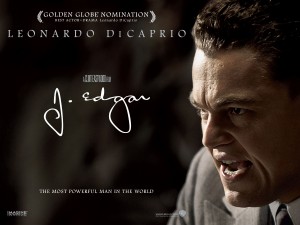J. EDGAR: 3 STARS
 Given the significance of J. Edgar Hoover to very fabric of his country it’s not surprising that he is the subject of a big screen biopic with a-list talent both in front of the camera–Leonardo DiCaprio in the title role and Naomi Watts–and behind–Clint Eastwood. No, what’s surprising is that it to this long. The man credited with creating the modern method of crime investigation died almost four decades ago. It’s almost as though he has hidden files on everyone in Hollywood, stashed away. Waiting…
Given the significance of J. Edgar Hoover to very fabric of his country it’s not surprising that he is the subject of a big screen biopic with a-list talent both in front of the camera–Leonardo DiCaprio in the title role and Naomi Watts–and behind–Clint Eastwood. No, what’s surprising is that it to this long. The man credited with creating the modern method of crime investigation died almost four decades ago. It’s almost as though he has hidden files on everyone in Hollywood, stashed away. Waiting…
“J. Edgar” spans fifty years, focusing on its subject’s career and the information he both gathered to use as leverage against his enemies and the secret he guarded which could have ruined his carefully constructed image as America’s top cop. Controversial, enigmatic and tyrannical, the power hungry Hoover used his position to bend the law to its breaking point in the name of reform, patriotism and personal glory. Trusty sidekick and constant companion Clyde Tolson (Armie Hammer) and faithful secretary Helen Gandy (Naomi Watts) assist in Hoover’s efforts to build the FBI, find the Lindbergh baby and discredit Martin Luther King, but this is Hoover’s story, warts and all.
“J. Edgar” is a handsome film. Eastwood brings a classic sensibility to the story, shooting on his now trademarked desaturated film stock, which gives an almost sepia tone to the movie, as though we’re actually looking at footage from years ago. It’s a nice touch that visually establishes a sense of history to go along with the period costumes and sets.
So far, so good. But as J. Edgar himself understood, appearances can be deceiving. Underneath the fine performances–more on those later–and craftsman like filmmaking is… not much. Or too much, depending on your point of view.
Lance Dustin Black’s script is ambitious, covering fifty turbulent years, both politically and personally for Hoover. But as the story jumps from decade to decade, interweaving old and young versions of the characters, you can’t help but wish Black and Eastwood had chosen one aspect of the story and told it well instead of this scattershot approach. It’s a case of too much information and too little insight.
DiCaprio is remarkable–and Oscar worthy–in his ability to convincingly play Hoover over the span of fifty years, although it must be said he is aided by some impressive makeup. Too bad Hammer as Hoover’s right hand man—and possible love interest—Clyde Tolson and Naomi Watts as the ever-faithful secretary Miss. Gandy, aren’t given the same advantage. Hammer, although effective in his role, resembles a burn victim for much of the movie and Watts, with her running eyes and wrinkled visage, a living Dorian Grey portrait.
The relationships between Hoover and, well, everyone, don’t feel genuine and as a result there is no emotional impact when the story could use one. We never get a true sense of why these two faithful companions give over their lives to Hoover, who, at best is a cold, calculating tyrant. Eastwood is clearly trying to create a real person out of Hoover, but having him writhing around on the floor, wearing his mother’s jewelry and dress, is a rather melodramatic way to go about it.
